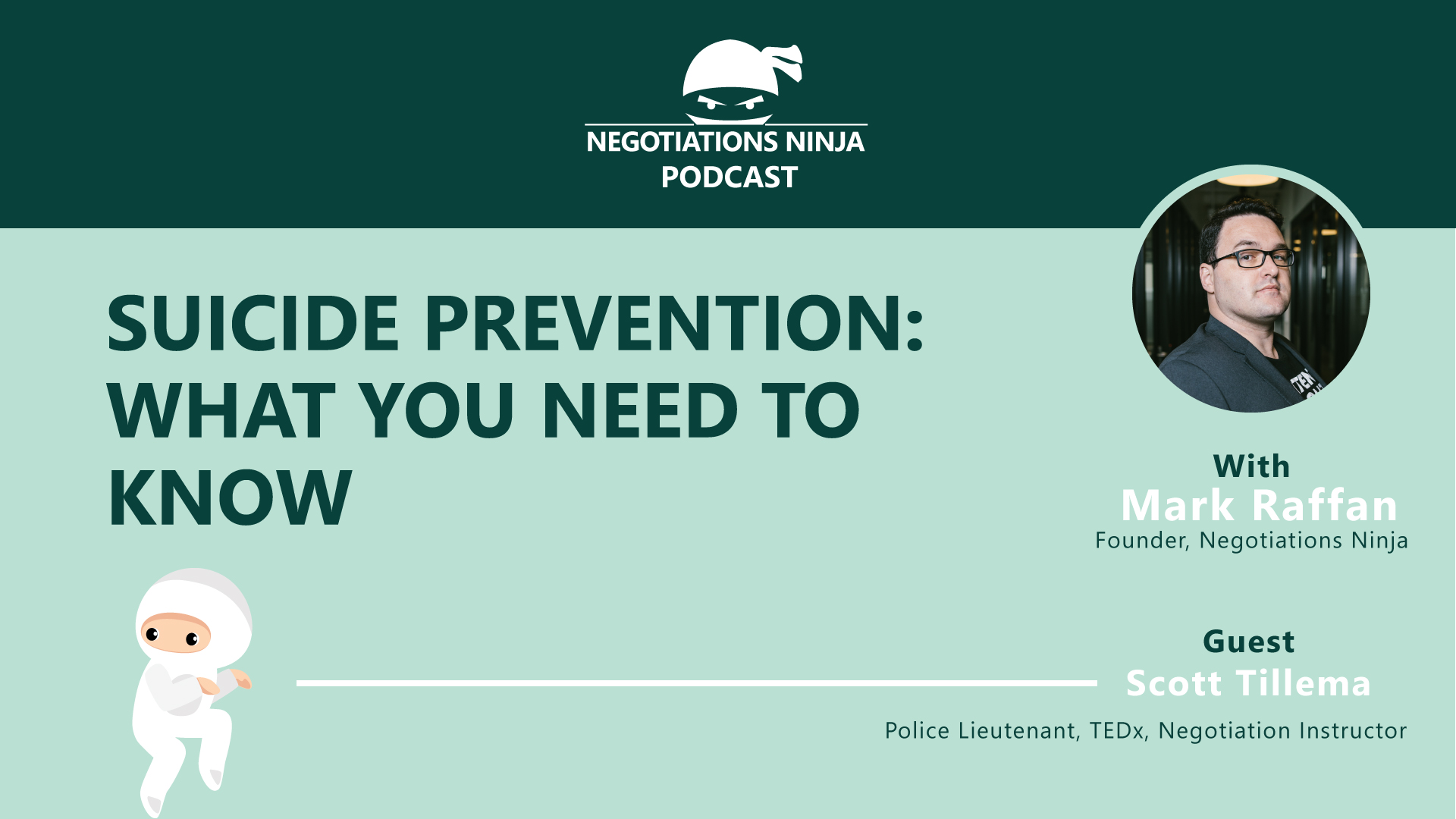Many people are struggling in the midst of the Coronavirus crisis. Some have lost their jobs and were the only source of income for their family. Others have become ill or know someone who has passed away. Many people feel lonely and isolated from loved ones and are struggling with thoughts of suicide. What do you do if a friend or family member is suicidal? What are some suicide prevention tips? What resources are available to guide you? Scott Tillema shares important suicide prevention strategies in this episode of Negotiations Ninja. Do not miss it.
Scott is a Police Lieutenant currently serving as the Department Coordinator of Training and Emergency Services in the Chicago suburbs. Scott spent many years in police hostage and crisis negotiation. Now, Scott works with the Schranner Negotiation Institute as a trainer and with the BigSpeak Speakers Bureau as a keynote speaker. Scott also travels the country speaking to police hostage negotiators, offering insight and training.
Outline of This Episode
- [0:34] Crisis negotiation and suicide prevention
- [2:28] Scott Tillema’s background in negotiation
- [4:33] Scott’s 4-Step suicide risk assessment
- [13:10] If a loved one is on the edge—what do you do?
- [16:22] Words or phrases to avoid in difficult conversations
- [18:33] Scott’s volunteer work with the crisis text line
- [21:15] Connect with Scott online
Scott’s 4 Step suicide risk assessment
Where do you need to start the conversation? Scott shares 4 steps that he uses to gauge the severity of the situation:
- Ask them if they’re having suicidal thoughts. Set the tone by letting them know you care about them and you’re worried about their safety. Scott implores you to “Be someone who DOES care—whether this person be a stranger to you, or whether they be a coworker or a family member.” If they say they’re not suicidal—at least they know that you’re available for a conversation when and if they need you.
- Ask if they have come up with a plan. Whether the plan is pills or a weapon, most people who are suicidal have thought about some plan to carry out their intentions. This escalates your level of concern. Even if your heart is in the right spot, you cannot help someone without the proper training. Get the support you need. You don’t want to question if you did the right thing.
- Ask if they have the means and access to carry out their plan. Do they have a gun? Are they looking to get one? You need to assess if they have the access and the means to carry through with their plan NOW. At this point, you know it won’t take much to follow-through.
- Ask if they have immediate plans to commit suicide. This isn’t where you help them find a therapist—this is when you pick up the phone, dial 9-1-1, and get them immediate intervention.
These 4 steps will give you a baseline of where you’re at with this person and how quickly you need to intervene or act.
Reach out for professional support
If you don’t have someone to support you and your friend, the likelihood of you being successful is low at best. That’s why Scott recommends you reach out for professional help immediately. If you can’t call 9-1-1, call the National Suicide Prevention Lifeline at 1-800-273-8255 to get someone on the phone. You can also have an anonymous text conversation with a trained counselor by texting 741741. Don’t do anything to incite this person to act. What does that mean? Listen to the full conversation for Scott’s thoughts.
Focus on the how—not the what
What do you do when you come across someone on the edge? Someone who is about to commit suicide, and you’re the only person who can intervene? Obviously, you don’t want to use a phrase such as “calm down” because it can escalate the situation.
Scott points out that the situation is going to be unique to the person you’re talking to and the situation they’re in at that moment. The words you say may be important, but the way you convey them is even more important. Deliver in a thoughtful, loving, and compassionate tone. It can cover a multitude of mistakes—including using the wrong words. You can even apologize for saying something that may have upset or offended them.
Slow down your words, talk in low and soothing tones, and be curious. The goal is to get them to open up and talk and keep them calm until help arrives. Scott shares some questions you can ask to get them conversing with you as well as other resources available to you—so listen to the whole episode now.
Resources & People Mentioned
- National Suicide Prevention Lifeline
- Suicide Assessment Five-Step Evaluation and Triage
- Suicidal Ideation Risk Assessment
- BigSpeak Speakers Bureau
- Schranner Negotiation Institute
Connect with Scott Tillema
Connect With Mark
- Follow Negotiations Ninja on Twitter: @NegotiationPod
- Connect with Mark on LinkedIn
- Follow Negotiations Ninja on LinkedIn
- Connect on Instagram: @NegotiationPod




